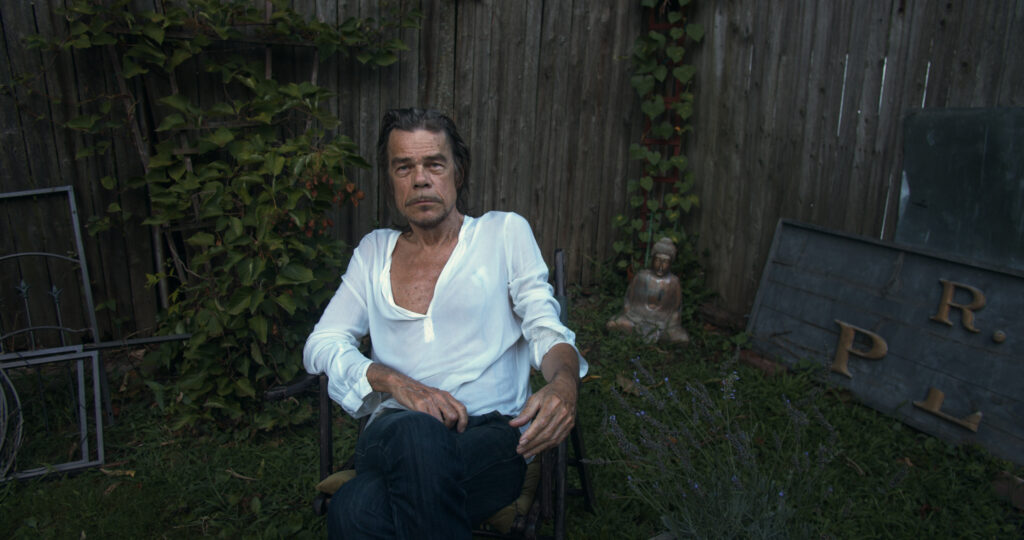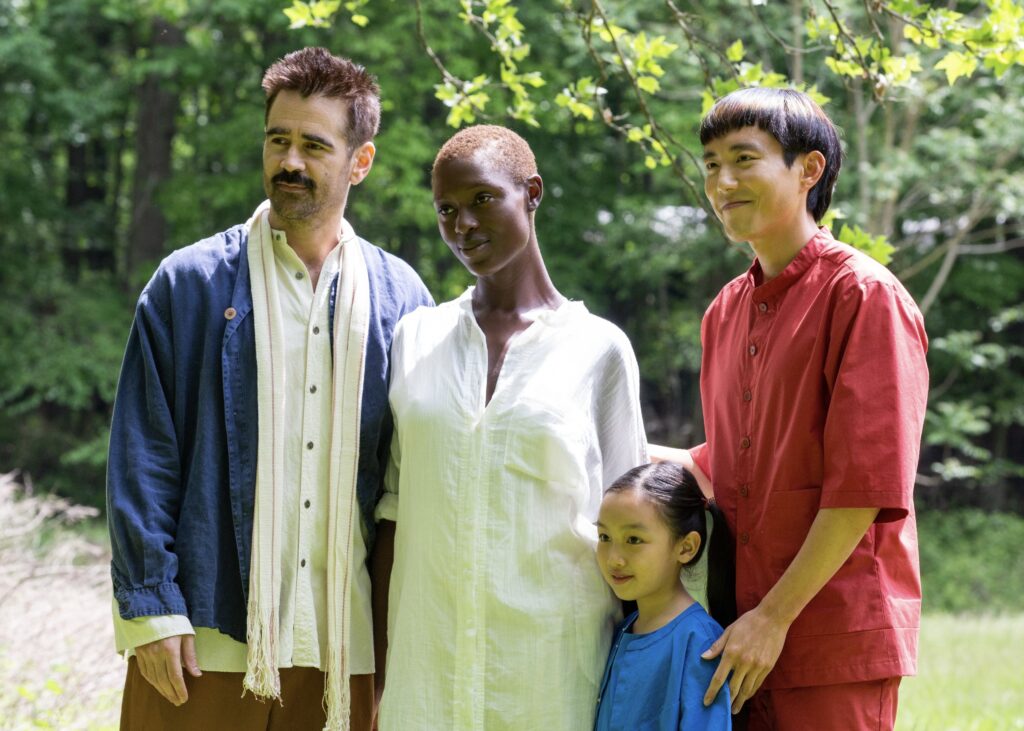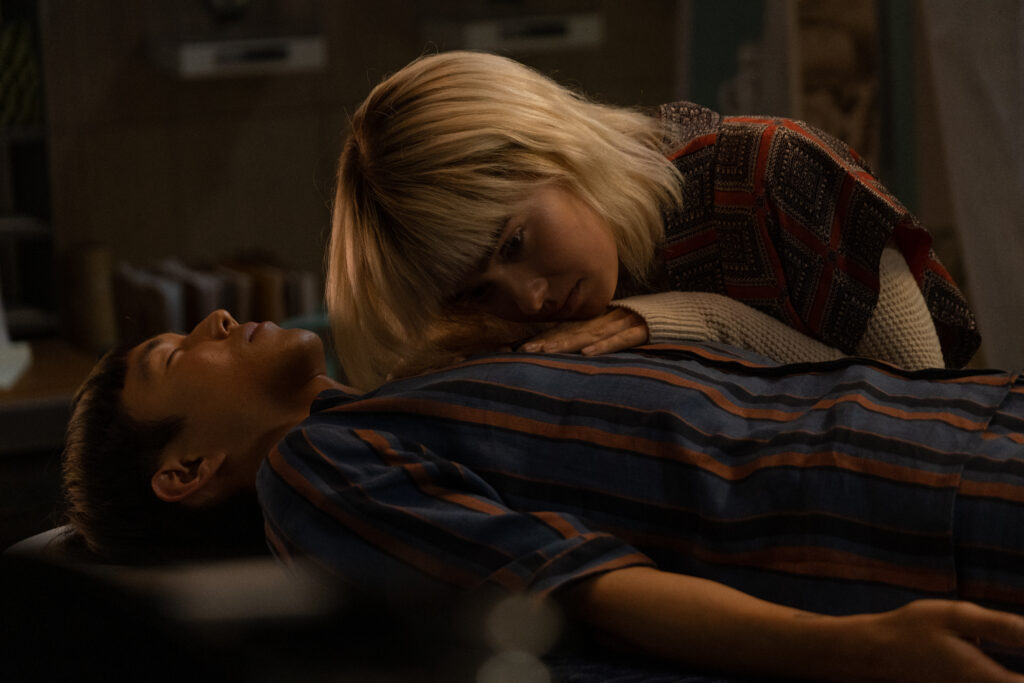October 12, 2022
by Carla Hay

“Personality Crisis: One Night Only”
Directed by Martin Scorsese and David Tedeschi
Culture Representation: Taking place primarily in New York City, the documentary film “Personality Crisis: One Night Only” features an all-white group of people discussing the life and career of former New York Dolls singer David Johansen (also known as Buster Poindexter), intertwined with footage of Johansen performing at a January 2020 show at Cafe Carlyle in New York City.
Culture Clash: As a member of the androgynous-looking New York Dolls, Johansen pushed against society norms of what male rock stars should look like, and he later upended expectations by reinventing himself as a vaudevillian performer named Buster Poindexter.
Culture Audience: “Personality Crisis” will appeal primarily to people who are fans of Joahnsen, the New York Dolls, and influential rock music that emerged in the late 1960s and early 1970s.

“Personality Crisis: One Night Only” sometimes stumbles with rambling repetition, but this documentary is a true reflection of its unique subject, David Johansen: full of fascinating stories and compelling to watch. The on-stage performances enliven this otherwise mostly predictable movie. Fans of Johansen probably won’t learn anything new, but it’s a capable biographical film that demonstrates why Johansen is a charismatic and often-underrated showbiz survivor. “Personality Crisis: One Night Only” had its world premiere at the 2022 New York Film Festival in New York City.
Directed by Martin Scorsese and David Tedeschi, “Personality Crisis: One Night Only” looks like a movie that isn’t intent on winning ant major awards but was made as sort of a gift for Johanen’s family members, close friends and fans. If you have absolutely no interest in the music that influenced punk rock and New Wave artists in the 1970s and 1980s, or if you have no interest in the New York rock music scene from that area, then you might be very bored by this movie, which is heavy on nostalgia for this culture. Johansen is an appealing but often unfocused raconteur, who sometimes goes off on tangents that might or might not hold the interest of viewers.
“Personality Crisis: One Night Only” is a mixture of footage from a January 2020 performance that Johansen did at the Carlyle Club (which is designed like a cabaret/supper club) in New York City; archival footage, mostly from the 1970s and 1980s; and exclusive interviews that he did for the documentary. In the Carlyle Club footage, Johansen performs various New York Dolls and solo artist songs as his alter ego, Buster Poindexter, a pompadour-styled, suit-wearing artist who brings a vaudevillian flair to his stage act.
The Carlyle Club footage includes Johansen performing songs such as “Funky But Chic,” “Melody” and (of course) “Personality Crisis.” The archival footage includes interviews and performance clips from shows such as “Late Night” (hosted by Conan O’Brien), “Later…With Jools Holland,” “Don Kirshner’s Rock Concert” and “Musik Laden.” The contrast is striking between Johansen’s fiery stage persona as lead singer of the New York Dolls and the grizzled cabaret performer he is in the Carlyle Club footage. You get the feeling that these images are never a complete façade. Johansen is just presenting his personality and state of mind that he had at the time.
Born in New York City in 1950, Johansen briefly mentions his childhood and his early love of music, but most of his commentary is about his life as an adult music artist. Johansen’s daughter Leah Hennessey conducted the exclusive interviews that Johansen did for “Personality Crisis: One Night Only.” It’s probably why the interviews don’t go deep into revelations that could be embarrassing or painful for Johansen and his family.
For example, during the Carlyle Club footage, Johansen lovingly points out his third wife, Mara Hennessey (they’ve been married since 2013), who watches his adoringly from the audience. Johansen says a heartfelt, “I love you to Mara,” and he comments on their courtship: “It was a scandal, but it was worth it.” This is where a better documentary would’ve gone into more details, but it just leaves that information to dangle, without answering any questions that viewers might have.
Mostly, Johansen reminisces fondly about his days on the New York music scene in the 1970s. Most people watching this film already know that the New York Dolls were a short-lived band of five musicians who wore makeup and feminine-looking clothes during a time when men could be arrested for wearing women’s clothes in public. The band played and lived fast and hard.
The first incarnation of the New York Dolls lasted from 1971 to 1976 and released just two albums, but influenced countless people. Although they were respected by many of their peers, the New York Dolls never quite became the American version of the Rolling Stones, as some people had predicted. (The Rolling Stones comparison had a lot to do with how Johansen physically resembled Rolling Stones lead singer Mick Jagger in those days and was known for his flamboyant stage presence.)
The New York Dolls were part of a movement of rock artists who played with ideas of defying society norms, including what is “masculine” and what is “feminine.” The band also straddled the line between hardcore punk and commercial pop. They wanted to be unconventionally edgy, but they also wanted to be played on mainstream radio and be famous enough to. (An archival New York Dolls concert clip shows Johansen proudly telling the audience that the band’s song “Trash” was getting played on AM radio.) I
In the documentary’s current interview footage, Johansen says of his attitude at the time: “I just wanted to be welcoming. I just wanted to bring those walls down and have a party.” He also says, “Ridiculousness, especially if it’s intelligent, is appealing to me.”
Even though the New York Dolls’ lineup had many iterations, Johansen was one of the constant members. Several former New York Dolls members are now deceased. Billy Murcia (drums) died in 1972. Johnny Thunders (guitar), who was Johansen’s main songwriting partner in the New York Dolls, passed away in 1991. Jerry Nolan (drums) died in 1992. Arthur Kane (bass guitar) died in 1991. (Kane was the subject of the 2005 documentary “New York Doll,” which gave more insight into the band than “Personality Crisis: One Night Only.”) Rick Rivets (guitar) passed away in 2019. Sylvain Sylvain (multi-instrumentalist) died in 2021. In “Personality Crisis: One Night Only,” the deaths of Murcia and Thunders get brief mentions.
If anyone is expecting wild tales of sex, drugs and rock and roll in this documentary, forget it. Decadence is only fleetingly referred to but never detailed in the movie. Johansen says in an archival interview that when he used to visit his visual artist friend Harry Smith (who died in 1991, at the age of 68), Smith’s Chelsea home was a “like a speed [amphetamine] den.” In the Carlyle Club footage, Johansen briefly describes working with music producer Todd Rundgren at Rundgren’s Hawaii home studio, which Johansen said looked like “a Colombian drug lord’s bagoda.”
Later on stage in the Carlyle Club footage, Johansen alludes to but never elaborates on his health problems. He mentions that because of the New York Dolls’ 2004 to 2011 reunion, his liver went “ba-boom,” and “that’s probably why you didn’t see me for a while.” At times, Johansen (who holds a drink in his hand while performing) tends to lose his train of thought. After performing “Melody,” Johansen says half-jokingly: “Where am I? Who am I?” Later, when starts to tell a meandering story about one of his experiences with friend at the legendary Max’s Kansas City nightclub in the 1970s, his longtime friend Penny Arcade, who’s in the audience, helps Johansen remember who else was with them and their mutual friend Ingrid Sylvester on that night.
In “Personality Crisis: One Night Only,” Morrissey (former lead singer of the Smiths) is briefly featured in new and archival footage as a New York Dolls superfan. Morrissey says that the New York Dolls should be more widely known, but drugs and the band’s controversial image probably prevented them from having more commercial success. He describes the New York Dolls as a “blighted band” and a “cursed band.” Morrissey (who was the New York Dolls’ U.K. fan club president when Morrissey was a teenager) comments that one of the main reasons why the New York Dolls appealed to him was because they weren’t just a loud and rude band, as their image suggested, but they were also “intelligent and witty.”
Viewers might be curious to watch this documentary because Scorsese is one of the directors. Make no mistake: As entertaining as “Personality Crisis: One Night Only” can be, it’s not on the same level as classic Scorsese music documentaries, such as 1978’s “The Last Waltz” (about the last performance of The Band’s original lineup) or 2011’s “George Harrison: Living in the Material World.” Some of the editing in “Personality Crisis: One Night Only” is very choppy and needed better fine tuning. For example, the Morrissey interview segment segues to archival concert footage of the Smiths, and this Smiths footage goes on for much longer than necessary. Other parts of the documentary have better editing, such as cuts between the New York Dolls performing the same song at different performances.
However, a documentary about David Johansen shouldn’t be too slick and polished, because that’s not the type of artist he is. On stage, Johansen exudes both cockiness and self-deprecation, which is part of the Buster Poindexter image, but it’s very much Johansen’s personality too. After all of his years in showbiz, Johansen still has a hard-to-describe star quality (even when he’s standing still on stage) that comes across as authentic. It’s why “Personality Crisis: One Night Only” shows how artists who were meant to last are the ones who aren’t manufactured.
Showtime will premiere “Personality Crisis: One Night Only” on April 14, 2023.







